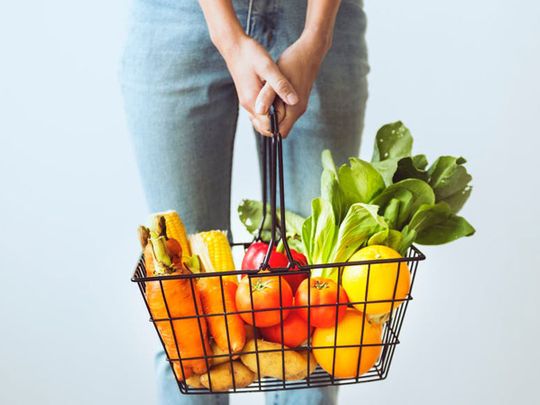
Dubai: The start of Ramadan means most of us are doing our grocery shopping with a lot more gusto. In fact, 54 per cent of consumers in Ramadan are focused on grocery shopping and a whopping 79 per cent are planning to consume healthy meals, according to data from Publicis Consumer Sentiment Tracker.
Imagine you've just done your grocery shopping. As you try to find room in the fridge for your new purchases, you discover a sad assortment of leftover fruit and veg, which find themselves banished to the trash. Although it is easy to fall into the trap of throwing away what was once perfectly good food, this is a scenario that can be avoided with a little know-how about storing food in the refrigerator.
The refrigerator isn’t just a haven for already-frozen food, you can freeze your fresh food to help prolong your groceries. This is crucial in light of the current situation, where we’re all being encouraged to minimize our contact via social distancing and stay indoors as much as possible. By freezing fresh foods, your supplies can last longer, you can batch cook without waste, and cut back on extra trips to the grocery store.
Gulf News speaks to Burcin Arabul, Head of Home Appliances at Samsung Gulf Electronics, for insider tricks on how to make your groceries last longer:
1. Keep your refrigerator clean
Having a clean and well organized fridge easily shows you what foods you have and what foods need to be used up. Not everything will last the same amount of time in the. Those chicken breasts should be cooked (or frozen) in 1-2 days, while apples will keep for up to 4-6 weeks, and strawberries will only be good for 3-6 days.
2. Which fruits can be stored outside the fridge?
In Ramadan, there is an increase in our consumption of fresh fruits and vegetables followed by dairy products. Some fruits will do better stored in the refrigerator (berries, watermelon, cherries, grapes) and some can be stored at room temperature (bananas, oranges, lemon). Others (like apples and pears) can be kept on your counter until they are ripe, and then stored in the refrigerator until you eat them.
3. What about vegetables?
Most vegetables should be stored in the high-humidity drawer of your refrigerator. (asparagus, broccoli, bok choy, cauliflower, beans). Some vegetables should be stored in the low-humidity drawer (mushrooms, okra, bell peppers, spinach) and a few do better stored at room temperature (onions, garlic, tomatoes, and potatoes)
4. Pay attention to the dates on the food package
The dates on the package your food came in is important for knowing if the food in your refrigerator is safe to eat. Once you open the package, you often need to use the product up before the date on the package. This may sound simple, but many people disregard these days and go by their nose. For your safety it is really recommended that you always read the label.
5. Cool foods in the refrigerator before bagging them for your freezer
Many times, we are tempted to freeze hot food right after we’ve taken it off the stove. The best method here is to cool your warm food down in the fridge first, and then take it to the freezer. Usually people struggle more with fridge space than freezer space, so one of our fridges, the Twin Cooling lets you convert the function of the entire refrigerator into a fridge so you have more space for your groceries.
6. Loosely cover food upon refrigeration
We usually love to seal our leftover air tight, but if you cover it loosely at first, it allows heat to escape, rather than creating a condensation layer of water that will drip back into your food. This method protects the food from accidental contamination during cooling.
Keep these in the fridge and they will last longer:
1. Lettuce
2. Eggplant
3. Fennel
4. Cucumber
5. Mushroom
6. Okra
7. Greens
8. Leek
9. Asparagus
10. Beetroot
11. Broccoli
12. Brussels Sprouts
13. Cabbage
14. Carrots
15. Cauliflower
16. Peas
17. Peppers
18. Spinach leaves
19. Beans
20. Bok Choy
21. Celery
22. Apples (They'll do best in the crisper drawer.)
23. Lemons/Limes
24. Oranges
25. Pineapple
26. Summer Squash/Zucchini
27. Rhubarb
28. Watermelon
29. Grapefruit
30. Berries
31. Cherries
32. Cranberries
33. Grapes
Keep these outside the fridge and they will last longer
6. Onions
7. Tomatoes (yes, actually!)
8. Potatoes
9. Garlic
10. Sweet Potatoes
11. Bananas
Items that you should ripened on the counter, then store in the fridge
1. Avocados
2. Mangoes
3. Pears
4. Plums Papayas
5. Cantaloupe
6. Corn
7. Apricots
8. Honeydew Melon
9. Kiwi
10. Peaches and Nectarines









